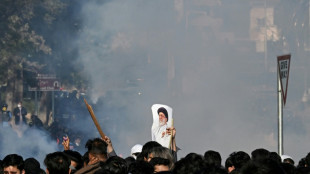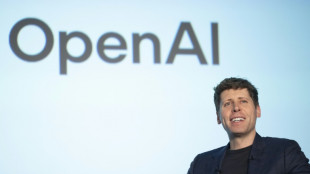
-
 'Sinners' wins top prize at Screen Actors Guild awards
'Sinners' wins top prize at Screen Actors Guild awards
-
New rules, same old suspects as F1 revs up for 2026 season

-
 World Cup tickets: Huge demand and sky-high prices
World Cup tickets: Huge demand and sky-high prices
-
List of key Actor Award winners

-
 Trump hunkers down after Iran strikes
Trump hunkers down after Iran strikes
-
China's leaders gather for key strategy session as challenges grow

-
 UK toughens asylum rules to discourage migration
UK toughens asylum rules to discourage migration
-
Israel hits Lebanon after Hezbollah fire, expanding Iran war

-
 CBS in turmoil as US media feels pressure under Trump
CBS in turmoil as US media feels pressure under Trump
-
Messi bags double as Miami battle back to down Orlando

-
 Greenland is 'open for business' -- kind of, says business leader
Greenland is 'open for business' -- kind of, says business leader
-
Canada's Carney to mend rift, boost trade as he meets India's Modi

-
 Crude soars, stocks drop after US strikes on Iran
Crude soars, stocks drop after US strikes on Iran
-
Iran war spreads across region as US, Israel suffer losses

-
 Miriam Margolyes tackles aging in Oscar-nominated short
Miriam Margolyes tackles aging in Oscar-nominated short
-
Recognition, not competition, for Oscar-nominated foreign filmmakers

-
 Israel, Hezbollah trade fire: latest developments in Iran war
Israel, Hezbollah trade fire: latest developments in Iran war
-
Israel strikes Tehran: latest developments in Iran war

-
 Trump vows to avenge first US deaths as Iran war intensifies
Trump vows to avenge first US deaths as Iran war intensifies
-
Lowry collapses late again, Echavarria snatches victory in Cognizant Classic

-
 Aubameyang strikes twice as Marseille edge Lyon in Ligue 1
Aubameyang strikes twice as Marseille edge Lyon in Ligue 1
-
Infantino says players who cover mouths when speaking could be sent off

-
 Bolsonaro son rallies the right as thousands protest Brazil government
Bolsonaro son rallies the right as thousands protest Brazil government
-
Juve stay in Champions League hunt with last-gasp Roma draw

-
 Maersk suspends vessel transit through Strait of Hormuz
Maersk suspends vessel transit through Strait of Hormuz
-
France, Germany, UK ready to take 'defensive action' against Iran

-
 Knicks halt Spurs' 11-game NBA winning streak
Knicks halt Spurs' 11-game NBA winning streak
-
EU warns against long war, urges 'credible transition' in Iran

-
 Bored of peace? Trump keeps choosing war
Bored of peace? Trump keeps choosing war
-
Arteta embraces Arsenal's 'Set-Piece FC' label after corners sink Chelsea

-
 Sevilla rescue derby draw to deal Betis top four setback
Sevilla rescue derby draw to deal Betis top four setback
-
India need 'special effort' to beat England in semi-final: Gambhir

-
 'A terrible day,' says Israel community shaken by deadly Iranian strike
'A terrible day,' says Israel community shaken by deadly Iranian strike
-
Arsenal corner Chelsea into submission, Man Utd climb to third

-
 Arsenal win set-piece battle to sink Chelsea in title boost
Arsenal win set-piece battle to sink Chelsea in title boost
-
What future for Iranian leadership after Khamenei's death?

-
 'Scream 7' makes a killing at N. America box office
'Scream 7' makes a killing at N. America box office
-
Thousands stranded as Iran conflict shuts Mideast hubs

-
 Samson's 97 puts India into T20 World Cup semi-final against England
Samson's 97 puts India into T20 World Cup semi-final against England
-
Latest developments as Iran retaliates to US-Israel strikes that killed Khamenei

-
 Spurs have 'big problems' says Tudor as relegation risk persists
Spurs have 'big problems' says Tudor as relegation risk persists
-
Dortmund captain Can out for season with ACL tear

-
 Leweling doubles up as Stuttgart sink sorry Wolfsburg
Leweling doubles up as Stuttgart sink sorry Wolfsburg
-
Man Utd climb to third, Fulham sink sorry Spurs

-
 Iran strikes send VIP Dubai influencers 'back to reality'
Iran strikes send VIP Dubai influencers 'back to reality'
-
Briton Brennan bursts to Kuurne-Bruxelles-Kuurne triumph

-
 Activists pressure Milan Fashion Week to go fully fur-free
Activists pressure Milan Fashion Week to go fully fur-free
-
Blasts in Kabul as Afghan govt says responding to Pakistan attacks

-
 Iranians grieve, celebrate, worry after Khamenei's killing
Iranians grieve, celebrate, worry after Khamenei's killing
-
Latest developments as Iran lashes out after US-Israel strikes kill Khamenei


'I don't have a voice in my head': Life with no inner monologue
Mel May only realised she was different while reading a news article one day.
"Wait, what? Some people hear a voice in their head?" she thought at the time.
She was stunned to discover that this was not just a figure of speech -- her friends were actually chatting to themselves in their minds.
May, a 30-year-old Australian video producer who lives in New York, remembers trying to explain to her family: "I don't have a voice in my head."
"My dad was like, 'You are lying'," she told AFP.
But her father came around once May started working with psychologists who agreed -- she is one of the very rare people who lack inner speech.
The idea that some people might not experience this phenomenon is so new that a clinical name, anendophasia, was only proposed for it in a paper last year.
The inner monologue has proven extremely difficult to study because it relies on people being able to describe how they think -- and it turns out we are unreliable narrators.
"People are ignorant about the characteristics of their own inner experience," Russell Hurlburt, a psychology professor at the University of Nevada, Las Vegas, told AFP.
"And it doesn't matter how confident you are," added Hurlburt, a pioneer in the field who has studied people with a range of inner experiences, including May.
Most people assume their inner voice is speaking all the time but it is actually just one of several phenomena of our inner experience, Hurlburt said.
Others include visual imagery, "unsymbolised thinking", feelings and sensory awareness.
- Only a quarter of the time? -
To study these phenomena, Hurlburt conducted research that would have a beeper go off at random while study participants were reading Franz Kafka's "The Metamorphosis" and describe what was in their head.
Rather than speaking the words in their inner voice, they were actually creating visual images -- "their own video" -- of the book, he said.
People also have different kinds of inner speech. Some have multiple voices, while bilingual people can switch languages.
Giordon Stark, a California-based particle physicist who was born deaf, has a mix of inner speech and visual images.
"I don't think of the word 'bed' in my head but I rather visualise the idea of my head hitting the pillow," which is similar to the sign language gesture for the word, the 34-year-old told AFP.
Pressed to estimate how often people are hearing an inner voice, Hurlburt emphasised that much more research is needed on the subject.
But a ballpark figure could be that people are "inner speaking" 20 to 25 percent of the time, he said.
That average includes people who have far more frequent speech and those with none, such as May.
"Her inner experience is close to being nothing but she's the exception rather than the rule," Hurlburt said.
Helene Loevenbruck, a leading inner voice researcher at France's Universite Grenoble Alpes, has had to change her mind on whether people like May could even exist.
"I thought everyone had an inner voice until very recently," she told AFP.
The idea ran counter to her previous work, which suggested inner speech was an important part of speaking out loud, serving as an "internal simulation".
But the work of Hurlburt -- and the discovery that some people cannot create mental images, a condition called aphantasia -- changed her mind.
- 'Pros and cons' -
May believes her lack of an inner voice is why she has never been an anxious person -- and why meditation is very easy for her.
Daniel Gregory, a philosopher specialising in inner speech at the University of Barcelona, said a potential disadvantage of having more inner speech is "a vulnerability to negative thought patterns, to rumination".
But we can also "use inner speech to encourage ourselves, to give ourselves positive messages", he told AFP.
May said a common response to hearing that she has no inner monologue is: "Wow, that must be amazing."
"I'm really quick to push back on that because I think certainly there are pros and cons," she said.
"I reflect a lot about what aspects of the lived experience I'm missing out on."
As well as not stressing about the future, May has a hard time remembering the past.
Loevenbruck said the people she had studied with aphantasia reported having "weird" autobiographical memories "because they have no sensory way of reliving a memory".
May emphasised that lacking an inner voice did not mean she was incapable of thought.
"I'm not dead inside. I know stuff and I feel stuff," said May, who plans to make a documentary about her experience.
Asked what was running through her head, she responded simply.
"Well, I'm sitting here, I'm listening to you and then I just automatically respond. And that's it.
"Isn't that how this happens for everyone?"
S.Gregor--AMWN



